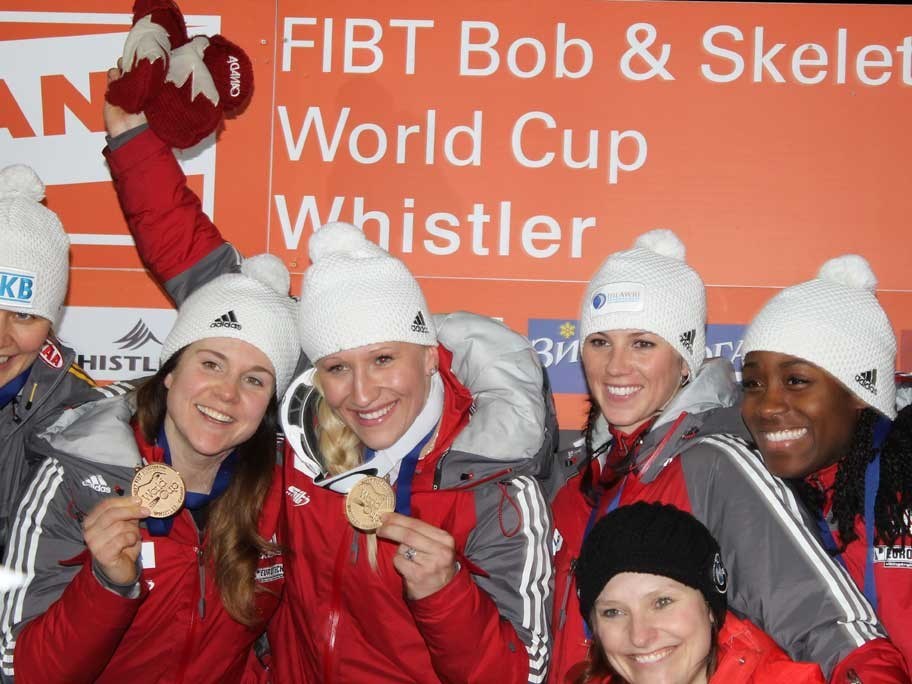This week will mark the two-year anniversary since the start of the 2010 Olympics, when Canada made history by winning the most gold medals of any nation in Winter Games history, and Canadians are still making history — almost exactly two years out from the Winter Games in Sochi, Russia.
From Thursday through Sunday, Canada's winter athletes earned a total of 24 medals, 12 of which were gold; five at the FIBT World Cup bobsleigh and skeleton races in Whistler; five at the World Cup freestyle competition at Deer Valley, Utah; three at the ski cross World Cup in Ontario; two in the men's World Cup downhill at Chamonix, France; two at the cross-country World Cup in Russia; five medals in a short track speed skating World Cup in Moscow, including a podium sweep for the men's team.
And that's on a weekend where a lot of athletes weren't even competing.
"There was no long track (speed skating), no hockey, no curling, no luge and no snowboard," said Ken Read, director for winter sports at Own the Podium.
Canadian curling teams won two medals the previous week in Japan, and are favourites going into the world championships in March. And while there was no luge race, Canada earned two medals at a Junior World Cup race in Germany.
Many of those medals weren't a surprise — Canada has been strong in freestyle and speed skating for years, for example — but the sheer number of medals speaks volumes for Own the Podium, which was established in 2005 to give Canadian athletes the support they needed to win medals at home in 2010.
Total funding for qualifying sports was increased by $118 million over a five-year period, and post-Games the federal government committed at least $30 million per year to keep the program alive. This year Own the Podium will distribute almost $58 million to sports organizations — $36.4 million for summer sports and $21.3 million for winter sports — on top of other funding programs for athletes and national sport organizations.
Read said the results this past weekend help make a case for continued funding of sports and long-term development of athletes.
"There's no question that it helps (to win medals)," said Read. "There was a poll taken fairly recently and 80 per cent of Canadians support Own the Podium and the concept, and this is tangible evidence of what we can achieve if we invest in our athletes and give coaches and athletes the opportunity to be successful."
Read also noted that the success was shared across Canada, with athletes that train in Whistler and Canmore for snow sports, sliders from Alberta and across the prairies, and a strong group of athletes in a range of sports that hail from Quebec.
"The fantastic thing is that these results are coming from everywhere," said Read.
He was encouraged by the number of new faces to reach the podium recently, keeping the momentum from 2010 going.
"It's always a concern that after 2010 we might see a drop-off, but thanks in part to the investment we based after the Vancouver and Whistler Olympics we're not seeing a fall-off, we're seeing a sustained, top-level performance," said Read.
However, looking forward, Read said there are some concerns over whether athletes will continue to be able to perform at this level. While the federal government has been contributing and sponsors have stepped up in many cases, he said there is not enough support at the provincial and local level.
"That is a challenge right now, that the financial support and also the vision at the next tier down (from national teams) is quite murky, and that's very concerning for us," said Read, "especially when we look towards 2018.
"We did a quick evaluation of our 2010 medallists and where they were seven years before the Vancouver-Whistler Games, and nearly 80 per cent were at the provincial level and not with a national team program. When we look to 2014 we know who the majority of athletes are, and they're already in the program and well funded — there are a few little issues here and there, but for the most part they're getting what they need.
"But when we look to 2018 it's a challenge, because we're concerned that many of the top performers today will not likely be here in 2018."
Read said now is the time for provinces and communities to invest in sport systems, including coaching, physiotherapy, strength and conditioning, "and teaching developing athletes in the next generation how to become champions.
"Now is the time to be aligning because we can't do everything and support all the sports."




